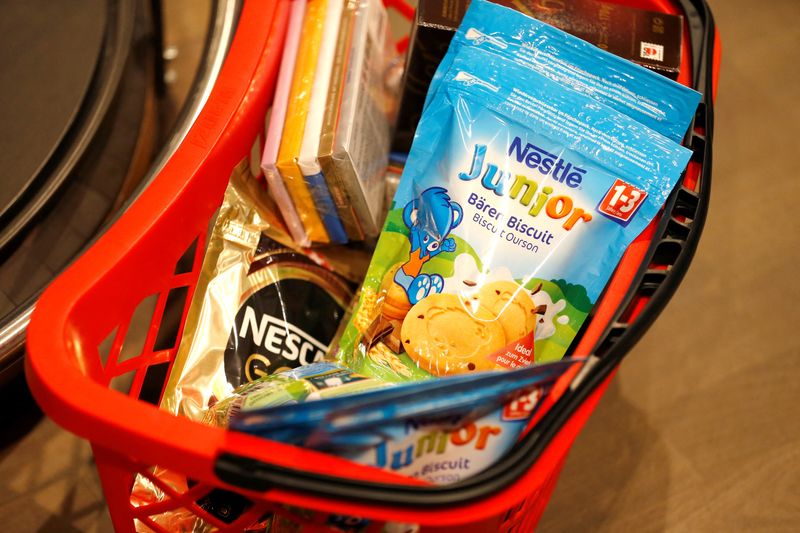By Joice Alves
LONDON (Reuters) - A big splurge in spending in China after Beijing lifted COVID-19 lockdowns will help cushion quarterly results of the world's biggest companies, investors say, even as forecasts suggest the United States and Europe are heading into a corporate recession.
Concerns are growing that tightening credit will dent the global economy. But recent data and upbeat comments from major companies like LVMH, Europe's most valuable listed company, about business in China have given investors some cause for optimism.
That could help extend a two-month long winning streak in global stocks after March's turmoil in the banking sector led investors to slice earnings estimates.
Refinitiv I/B/E/S data points to a 2.5% decline in earnings growth in the first quarter for STOXX 600 companies, down from a forecast for 5.4% growth prior to the banking chaos.
Europe earnings revisions, https://fingfx.thomsonreuters.com/gfx/mkt/dwpkdlrokvm/Europe%20earnings%20revisions.png
In the United States, where major banks have already reported first-quarter results, earnings for S&P 500 companies are seen falling 4.7% in the quarter, an improvement from an expected 5.2% drop seen earlier in April.
That would be a second consecutive quarter of decline, however, marking a corporate recession. Europe is headed for a recession too, the data shows, with a drop in earnings of 5.4% expected in the second quarter.
U.S. earnings revisions, https://fingfx.thomsonreuters.com/gfx/mkt/zgpobzmqqvd/U.S.%20earnings%20revisions.png
But investors interviewed by Reuters are more optimistic than the headline forecasts suggest, saying not only that growth momentum has rebounded strongly in China, but that it is holding better than expected in the United States and Europe.
"There is room for a positive (earnings) surprise, overall, supported by better economic momentum, particularly in China but (also) Europe hasn't been as bad as people expected," said James Rutland, fund manager at Invesco in London.
Barclays (LON:BARC)' European Equity Strategy Emmanuel Cau said there are signs that inflation is easing and the bulk of interest rate rises is done, but that markets are "still very defensive".
"People have been preparing for the worst for months and the worst is not happening yet," Cau said.
Euro zone producer prices fell for a fifth consecutive month in February, and surveys on Thursday showed the bloc's economic recovery unexpectedly gathered pace this month.
U.S. consumer prices rose in March at their slowest pace in nearly two years.
FOCUS ON BANKS
Fears of a major bank crisis have eased after U.S. major lenders Morgan Stanley (NYSE:MS), JPMorgan Chase & Co (NYSE:JPM), Bank of America Corp (NYSE:BAC) and Citigroup Inc (NYSE:C) reported profits that beat earnings forecasts in the first quarter.
In Europe, where big banks Barclays, Santander (BME:SAN), Deutsche Bank (ETR:DBKGn), UBS and embattled Credit Suisse (SIX:CSGN) are reporting results this week, "financials could determine the fate of the overall market's earnings", Barclays strategists said.
Only a few weeks ago, at the peak of the banking sector turmoil, markets were bracing for a deep downturn and even for central banks to reverse course and start cutting interest rates. But stubbornly high inflation means major central banks are expected to continue to hike rates, at least in May.
The prospect of higher borrowing costs has been a boon for banks, like Spain's Bankinter, which reported a surge in net profit as lending income soared.
European financials are expected to report first-quarter earnings growth of 31%, according to Refinitiv.
DEMAND?
But investors are also watching for signs that tightening credit conditions are having an impact, with major consumer products companies Nestle, Durex-maker Reckitt and Unilever (LON:ULVR) reporting results this week.
If consumer demand proves to be holding up and input costs falling, that mix could favour margins, investors said.
On Friday, Procter & Gamble Co raised its sales forecast and beat quarterly results estimates, as price hikes boosted margins and offset the hit from consumers trading down to cheaper brands.
Stephane Ekolo, a global equity strategist at the brokerage Tradition, expects U.S. and European earnings to beat expectations because he thinks estimates are too low.
Margins may start falling, however, as it will be difficult for many companies to continue passing higher costs on to consumers, Ekolo said.
Better-than-expected results from luxury eyewear maker EssilorLuxottica and Europe's biggest tech company ASML Holding (AS:ASML) NV, in addition to iron ore producer Rio Tinto (LON:RIO)'s strong quarterly shipments, offered hopes demand remains more solid than feared.
But the world's biggest iron ore producer warned of "persistently high" U.S. inflation, and a tightening of credit conditions will weigh on economic activity across the board.
Car maker Tesla Inc (NASDAQ:TSLA)'s quarter-on-quarter sales growth was modest despite price cuts as rising competition and a bleak economic outlook weighed.

Higher wages in Europe, which could partially erode corporate margins, will likely support demand as jobs data points to a still-tight labour market, Invesco's Rutland said.
"You've seen positive wage negotiations. Now in Europe, we have a heavily unionized labour force that comes through with a bit more of a lag than perhaps we see in other economies," he said.